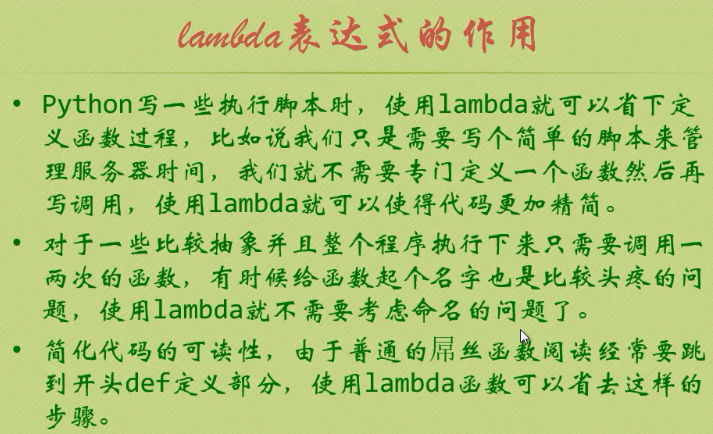函数:程序个体中的代码块(优点:可以降低代码量/维护成本,使程序更容易阅读)
def dec2bin(string_num): num = int(string_num) mid = [] while True: if num == 0: break num, rem = divmod(num, 2) mid.append(base[rem]) return ''.join([str(x) for x in mid[::-1]])
函数的参数:def/add/result,应该尽量精简
形参()里的x
def MyFun(x): return x ** 3 y = 3 print(MyFun(y))
实参:递入的具体值
>>> def MyFirstFunction(name): '函数定义过程中的name是叫形参' #因为Ta只是一个形式,表示占据一个参数位置 print('传递进来的' + name + '叫做实参,因为Ta是具体的参数值!') >>> MyFirstFunction('小甲鱼') 传递进来的小甲鱼叫做实参,因为Ta是具体的参数值!
关键字参数Create
def SaySome(name,words): print(name+'->'+words) >>> SaySome('小甲鱼','让编程改变世界') 小甲鱼->让编程改变世界 >>> SaySome('让编程改变世界','小甲鱼') 让编程改变世界->小甲鱼 >>> SaySome(words='让编程改变世界',name='小甲鱼') 小甲鱼->让编程改变世界
默认函数
>>> def SaySome(words='让编程改变世界',name='小甲鱼'): print(name+'->'+words) >>> SaySome() 小甲鱼->让编程改变世界 >>> SaySome('苍井空') 小甲鱼->苍井空 >>> SaySome(name=苍井空) Traceback (most recent call last): File "<pyshell#67>", line 1, in <module> SaySome(name=苍井空) NameError: name '苍井空' is not defined >>> SaySome(name='苍井空') 苍井空->让编程改变世界
收集(可变)参数
def test(*params): print('参数的长度是:',len(params)) print('第二个参数是:',params[1]) >>> test(1,'小甲鱼',3.14,) SyntaxError: invalid character in identifier >>> test(1,'小甲鱼',3.14,5,6,7) 参数的长度是: 6 第二个参数是: 小甲鱼
def test(*params,exp=8): print('参数的长度是:',len(params),exp); print('第二个参数是:',params[1]); >>> test(1,'小甲鱼',3.14,5,6,7,8,exp) Traceback (most recent call last): File "<pyshell#87>", line 1, in <module> test(1,'小甲鱼',3.14,5,6,7,8,exp) NameError: name 'exp' is not defined >>> test(1,'小甲鱼',3.14,5,6,7,8,exp=8) 参数的长度是: 7 8 第二个参数是: 小甲鱼
函数的返回值:return/返回定义值
def gcd(x,y): while y: t=x%y x=y y=t return x
函数与过程的区别(函数一定要有结果,过程没有结果)
def hello(): print('Hello,World!') >>> temp=hello() Hello,World! >>> temp >>> print(temp) None >>> type(temp) <class 'NoneType'> def back(): return[1,3.14,'小甲鱼'] >>> back <function back at 0x000001D67BB98F28> >>> back() [1, 3.14, '小甲鱼'] def back(): return 1,3.14,'小甲鱼' >>> back() (1, 3.14, '小甲鱼')
变量的作用域:局部变量和全局变量
def discounts(price, rate): final_price = price * rate #final_price是局部变量 return final_price old_price = float(input('请输入原价:')) rate = float(input('请输入折扣率:')) new_price = discounts(old_price, rate) print('打折后价格是:', new_price)
var = ' Hi ' def fun1(): global var var = ' Baby ' return fun2(var) def fun2(var): var += 'I love you' fun3(var) return var def fun3(var): var = ' 小甲鱼 ' print(fun1())
def MyFun(): global count count=-10 print(10) >>> MyFun() 10 >>> print(count) -10
内嵌(内部)函数
def outside(): print('I am outside') def inside(): print('I am inside') >>> inside() #内嵌函数无法在函数外进行调用 Traceback (most recent call last): File "<pyshell#234>", line 1, in <module> inside() NameError: name 'inside' is not defined >>> outside() I am outside
def fun1(): print('fun1()正在被调用') def fun2(): print('fun2()正在被调用') fun2() >>> fun1() fun1()正在被调用 fun2()正在被调用
>>> fun2()
Traceback (most recent call last):
File "<pyshell#202>", line 1, in <module>
fun2()
NameError: name 'fun2' is not defined
闭包(closure)
def funOut(): def funIn(): print('宾果!你成功访问到我啦!') return funIn() funOut()
>>> def FunX(x): def FunY(y): return x*y return FunY >>> i=FunX(8) >>> i <function FunX.<locals>.FunY at 0x000001D67BBD06A8> >>> type(i) <class 'function'> >>> i(5) 40 >>> FunX(8)(5) 40 >>> FunY(5) Traceback (most recent call last): File "<pyshell#212>", line 1, in <module> FunY(5) NameError: name 'FunY' is not defined
def Fun1(): x=5 def Fun2(): x*=x return x return Fun2 >>> Fun1() <function Fun1.<locals>.Fun2 at 0x000001D67BBD08C8> >>> def Fun1(): x=5 def Fun2(): x*=x return x return Fun2() >>> Fun1() Traceback (most recent call last): File "<pyshell#218>", line 1, in <module> Fun1() File "<pyshell#217>", line 6, in Fun1 return Fun2() File "<pyshell#217>", line 4, in Fun2 x*=x
def Fun1(): x=[5] #改良方法 def Fun2(): x[0]*=x[0] return x[0] return Fun2() >>> Fun1() 25
def Fun1(): x=5 def Fun2(): nonlocal x #Python3的进一步改进 x*=x return x return Fun2() >>> Fun1() 25
def outside(): var = 5 def inside(): var = 3 print(var) inside() outside() def outside(): var = 5 def inside(): nonlocal var print(var) var = 8 inside() outside()
匿名函数lambda
def ds(x): return 2*x+1 >>> ds(5) 11 >>> lambda x:2*x+1 <function <lambda> at 0x000001D67BBE2048> >>> g=lambda x:2*x+1 >>> g(5) 11 def add(x,y): return x+y >>> add(3,4) 7 >>> lambda x,y:x+y <function <lambda> at 0x000001D67BBE2268> >>> g=lambda x,y:x+y >>> g(3,4) 7
.
两个牛逼常用的函数filter()过滤无用/不用信息和map()映射
filter(None,[1,0,False,True]) <filter object at 0x000001D67BBD9BA8> >>> list(filter(None,[1,0,False,True])) [1, True]
def odd(x): return x%2 >>> temp=range(10) >>> show=filter(odd,temp) >>> list(show) [1, 3, 5, 7, 9] list(filter (lambda x:x%2,range(10))) [1, 3, 5, 7, 9]
list(map (lambda x:x*2,range(10))) [0, 2, 4, 6, 8, 10, 12, 14, 16, 18]
def is_odd(x): if x % 2: return x else: return None >>> is_odd(0) >>> is_odd(101) 101 >>> lambda x : x if x % 2 else None <function <lambda> at 0x000001D67BBE26A8> >>> y=lambda x : x if x % 2 else None >>> y(100) >>> y(101) 101
搞清下面的概念,异同:序列/列表/元组/字符串/循环函数
模块
对象
def funOut():
def funIn():
print('宾果!你成功访问到我啦!')
return funIn()

